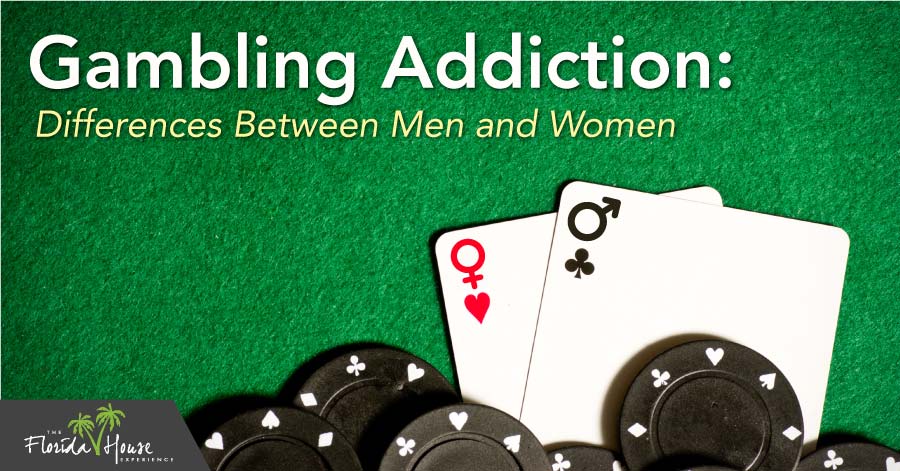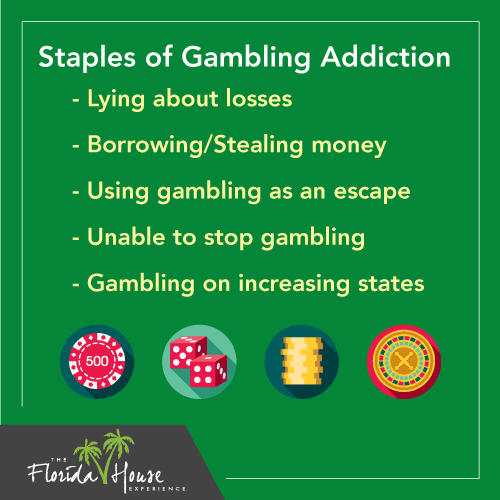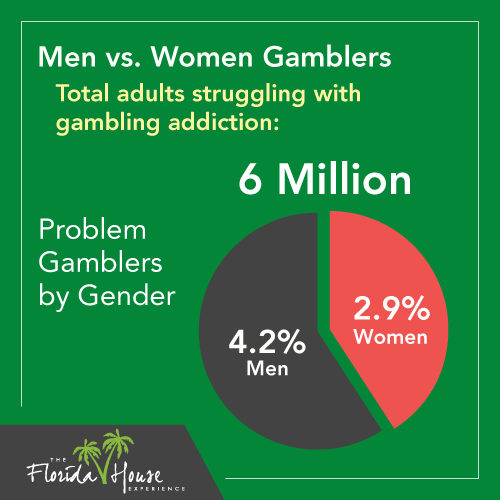
At FHE Health, we get prospective patients asking about more than just addiction to drugs or alcohol. Many patients are addicted to food, sex or gambling, addictions that are considered behavioral rather than physical.
You might think that suffering from an addiction that doesn’t affect the brain like opiates or alcohol is different from traditional addictions to substances, but actually, it’s very similar. According to Psychology Today, because of the way some behaviors cause the brain to react, behavioral addictions manifest in a way that’s extremely similar to physical addictions to drugs and alcohol.
We’re going get deeper into the numbers about one of the most common behavioral addictions: gambling addiction. Here, we’ll discuss some of the statistics surrounding the following:
- What gambling addiction is and how people can get addicted
- How many adults in the U.S. currently struggle with gambling addiction
- Whether or not men take part in “problem gambling behavior” more often than women
If you or a loved one find yourself struggling with an addiction to gambling, you have options. Contact FHE Health to learn about how to get the help you need.
What Is Gambling Addiction?
 Gambling addiction, also known as “compulsive gambling,” is a behavioral addiction in which a person has an uncontrollable urge to continue gambling, including casino table games, slot games, card games, betting on horse racing, sports outcomes and largely, any game or sport where money is wagered and won (or lost).
Gambling addiction, also known as “compulsive gambling,” is a behavioral addiction in which a person has an uncontrollable urge to continue gambling, including casino table games, slot games, card games, betting on horse racing, sports outcomes and largely, any game or sport where money is wagered and won (or lost).
Gambling addiction is similar to addiction to drugs or alcohol because it’s common in people with more impulsive traits and personalities. Many people begin playing games for money online, from fantasy sports to online card games. In the past decade, the U.S. has seen guidelines and regulations loosen around the topic of gambling, with many states legalizing casinos in their largest cities as a new form of revenue.
This has led to an increase in what’s referred to as “problem gambling.” This is gambling behavior that’s frequent or reckless, often when someone can’t keep themselves from betting more and more, even without having the funds to support their addiction. The added wrinkle to this specific addiction makes it more complicated than some other behavioral addictions.
Negative Consequences of Compulsive Gambling
The consequences of gambling addiction include:
- Financial problems like debts, defaulted credit cards and late payments
- Health problems: gambling, like many compulsions, can take a toll on a person’s self-worth
- Strained relationships
- Legal trouble: compulsive gamblers may cheat or steal money
Behavioral addictions come with a form of withdrawal when the behavior stops, similar to the way physical symptoms manifest when a person tries to stop using drugs or alcohol. A gambling addict may feel restless, irritable and anxious when they attempt to cut down on the behavior.
Risk Factors
It should be noted that most people who play cards, bet on horses or sports results or go to a casino don’t become addicts. Out of approximately 15 percent of U.S. adults who gamble, experts estimate that only about 2 or 3 percent of that population meets the criteria for compulsive gambling — about 6 million adults.
With this in mind, if you notice a friend, loved one or someone close to you starts to act differently, there are some predictive factors that make them more likely to become gambling addicts you should be aware of.
Some of the factors that can have a predictive effect on a person’s potential for “problem gambling” include:
- Mental health disorders: Studies suggest that people with mental disorders, especially those that affect impulse control (attention deficit disorder, for example) are more like to develop gambling addictions if they start gambling
- Age: Younger people are more likely to develop gambling issues than their older counterparts
- Influence of friends or family: People with early exposure to problem gambling at home or in their peer group are more likely to develop these problems themselves
Does Gender Play a Role?
 In short, yes. A 2013 study comparing problem gambling rates between men and women found that the numbers of men and women who reported instances of gambling weren’t that different, but there was a fairly wide rift in the numbers of men and women who met the criteria to be considered gambling addicts:
In short, yes. A 2013 study comparing problem gambling rates between men and women found that the numbers of men and women who reported instances of gambling weren’t that different, but there was a fairly wide rift in the numbers of men and women who met the criteria to be considered gambling addicts:
Only 2.9 percent of women were found to be problem gamblers, compared to 4.2 percent of men. Consider the number that we discussed previously to encompass the number of U.S. adults struggling with gambling addiction: 6 million.
Using the rates of men vs. women found in the 2013 study, that’s about a 59 percent to 41 percent difference between the sexes. Taken out of 6 million, that’s around 2.5 million women and 3.5 million men who are problem gamblers in the United States.
The numbers were more extreme among college students, the section of the U.S. population that gambles the most, according to the numbers (84 percent of college women and 91 percent of men reported gambling during the previous year). Problem gambling rates were 14 percent for men and 3 percent for women studied in the research.
Why Is There a Difference?
It’s clear that men are more prone to gambling addiction than women. There are a few reasons why this might be the case:
- Men tend to be sports fans at a higher rate. Men are more likely to be die-hard sports fans, making them more likely to start betting on games. In some sports, it’s well-documented that betting ads can be prevalent during commercial breaks, encouraging viewers to start gambling.
- Men are more likely to spend social nights at casinos. Males are known to have a more hedonistic nature, meaning that casinos are a more popular spot for nights out in male groups than female.
- Men are proven to be more impulsive in the face of stress. A study that measured how men and women differ in their reactions to stress showed that men are more likely to take impulsive risks in stressful situations.
How to Counteract These Risk Factors
It’s important to remember that this doesn’t mean women don’t need to worry about their gambling habits as much as men; it’s simply a broad look at the landscape surrounding problem gamblers in the United States.
If you or a loved one appears to be suffering from gambling addiction, contact FHE Health as soon as possible.
References:
https://www.psychologytoday.com/us/blog/why-cant-i-stop/201606/what-is-behavioral-addiction






